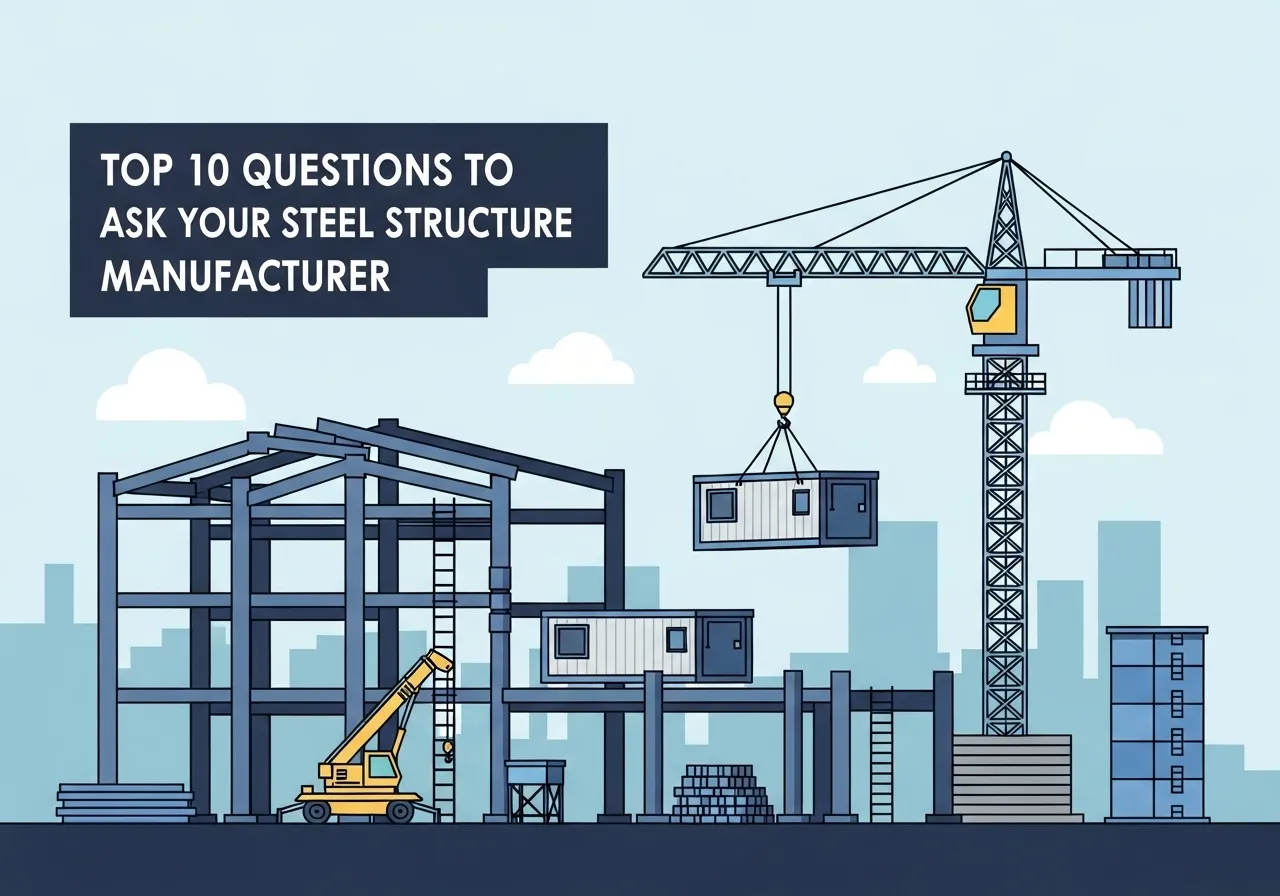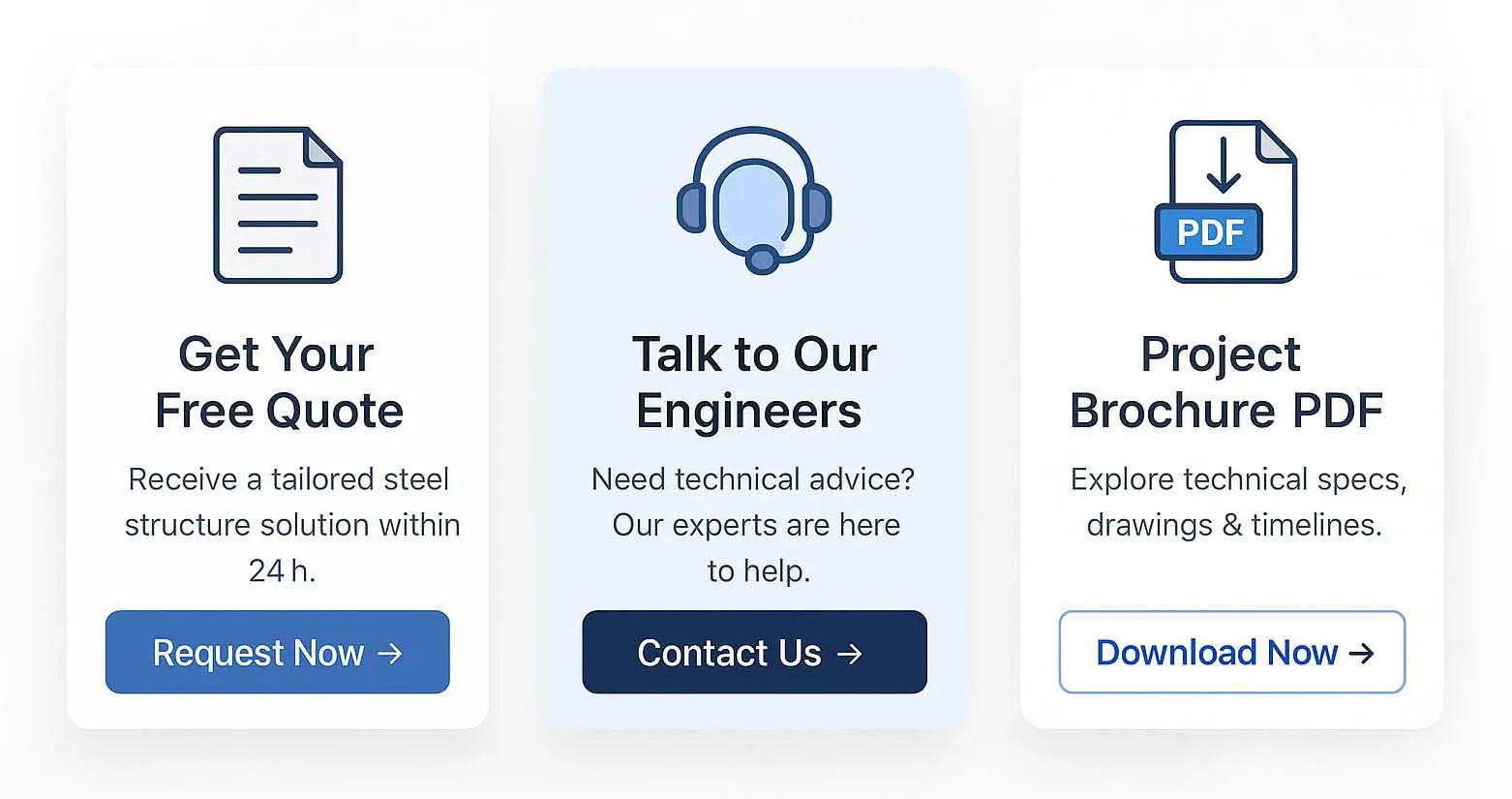Time:2025-08-27 07:56:43 Source:Sanjian Meichen Steel Structure

Choosing the wrong steel structure manufacturer leads to disaster: project delays, hidden costs, safety problems, and stress you don't need.
The top 10 questions to ask your steel structure manufacturer before you order will protect your project and your money by helping you find the best partner.
If you're managing a large EPC project in petrochemicals, energy, or industrial parks, picking a steel structure manufacturer is one of your highest stakes decisions. I've seen projects go off the rails from skipped due diligence—cost overruns, quality failures, and delays that wreck revenue targets. Asking the right questions before you sign a contract filters out unfit suppliers and sets your project up for success. So, let's walk through the 10 questions every procurement manager needs to ask—questions I wish I'd known earlier in my career.
Getting the right answers from your steel structure manufacturer avoids hidden risks that can cost you time, money, and even safety—so what should you ask first?
Asking these questions helps you compare suppliers on material quality, production, logistics, and more. It increases transparency, prevents costly mistakes, and forms stronger project partnerships.
When I started out, I trusted the cheapest supplier. But they missed deadlines, cut corners, and ignored codes. Now, I always start with focused questions. This process filters out suppliers with poor communication or hidden issues early, letting me shortlist only those who meet—or exceed—my expectations. It also builds a spirit of partnership. Transparency on both sides creates a foundation for successful, long-term collaboration.
Project requirements change based on steel grade. How do you check if your manufacturer can supply exactly what you need, like Q355B, Q345B, or other standards?
Ask your supplier which grades and standards (GB/T, EN, ASTM, etc.) they support. Clarify whether they keep those materials in stock and if substitutions are possible.
I learned early to always request a detailed inventory list. Some suppliers only carry basic grades, causing delays or quality issues on custom projects. Others can source almost anything you need, but with long lead times. If your project specs call for a specific grade—like Q355B for seismic zones—verify it's available and ask if the supplier can prove equivalent material grades if needed.
| Standard | Common Grades | Notes |
|---|---|---|
| GB/T | Q235B, Q345B | Widely used in China |
| EN | S235, S355 | European standard |
| ASTM | A36, A992 | US & international projects |
How can you guarantee your steel structure meets quality and safety standards? What paperwork—like test reports—should you ask for?
Ask to see ISO, CE, AISC, or national certifications. Request Mill Test Certificates, welding inspection reports, and quality assurance documentation.
I once received a batch of steel with fake certificates and failed weld inspections. Since then, I insist every shipment includes test reports and certifications as per project standards. Top suppliers have no problem providing documentation upfront. Others hesitate or delay—an immediate red flag.
| Certificate Type | What It Verifies |
|---|---|
| Mill Test Certificate | Steel grade, composition |
| Welding Report | Conformance with codes |
| ISO/CE/AISC | Factory meets standards |
How do you confirm your manufacturer can handle your project's size and delivery schedule without bottlenecks?
Ask about their annual tonnage, workshop size, main production lines, and any automation or CNC tech for complex work.
Early in my career, my supplier took on more work than they could handle. Shoddy planning led to site downtime and endless excuses. I now check production stats, visit the factory, and inspect equipment personally. Reliable partners transparently share their stats, like annual tonnage and production lines, so I can be sure they're a match.
| Metric | Why It Matters |
|---|---|
| Annual Capacity (tons) | Can they handle your project? |
| Factory Size (m²) | Larger = more complex jobs |
| Automation Level | Precision, consistency |
If your project schedule is tight, how do you check if your supplier can meet deadlines or help in emergencies?
Request average lead times for standard and rush orders. Ask for examples of expedited projects they have delivered on time.
I've dealt with slow suppliers who missed critical install windows, leading to higher costs and wasted labor. Now, I never just ask “What’s your delivery time?” I press for details on normal vs. urgent delivery, penalty clauses, and their methods for preventing bottlenecks. Good suppliers provide clear answers backed by past examples.
| Type | Timeline (weeks) | Notes |
|---|---|---|
| Standard | 4-8 | Typical for large projects |
| Expedited | <4 | Requires additional cost |
| Custom/Fast | Negotiable | Based on scope/complexity |
Can your supplier support unique requirements—custom sizes, modular design, or special fabrication details?
Ask if they have an in-house design team, BIM modeling, or partnerships with design institutes. Confirm support for shop drawings and custom fabrication.
Some projects need non-standard connections or geometries. Years ago, I lost time when my supplier couldn’t handle non-standard columns. Now, I look for partners who offer full support—from drawings to complicated assemblies. This flexibility is critical for tight schedules and high-precision builds, where design and supply must be tightly coordinated.
| Service | Advantage |
|---|---|
| Custom Detailing | Fit special site or design constraints |
| BIM Modeling | Avoid clashes, optimize construction |
| Shop Drawings | Minimize onsite rework |
How do you prevent surprises down the line with hidden charges or missing details?
Review quotations for full scope: materials, coatings, transport, hardware, and installation. Ask directly about all possible extra charges.
On my first international project, the cheapest quote came with dozens of extra add-ons—blowing my budget. Now I require line-item quotes, breaking down every element. Top suppliers offer clear, detailed proposals that make it easy to compare and spot hidden costs. This helps avoid disputes and build trust.
| Quotation Items | Should Cover |
|---|---|
| Materials | Grade, standard, supply scope |
| Surface Treatment | Paint, galvanizing |
| Delivery & Packaging | Location, method |
| Accessories & Hardware | Bolts, fasteners, floor systems |
How do you know if your supplier has relevant experience and a good reputation?
Ask for recent case studies and client references for similar projects in your sector.
A new supplier once claimed impressive capacity but offered no proof. I learned never to skip this step. The best partners show off success stories and connect you with past clients, so you can ask about their strengths—and weaknesses—directly.
| Evidence Type | What It Provides |
|---|---|
| Project Photos | Visual proof of similar jobs |
| Testimonial Letters | Feedback from previous clients |
| Reference Contacts | Direct line to end users |
How do you confirm your supplier has robust processes for structural integrity, surface finish, and welding quality?
Request documentation on QA/QC, from ultrasonic weld tests to coating inspection. Ask about warranty and third-party inspection.
Years ago, I saved a client's project by catching poor blasting at an early stage. Now, I always demand documentation. The best manufacturers describe a clear process and outcomes, plus how issues get fixed under warranty. If they say “Don’t worry, we always do it right,” it’s a warning sign.
| QA/QC Step | Method/Procedure |
|---|---|
| Weld Inspection | Ultrasonic, visual |
| Surface Prep & Coating | Blasting, painting records |
| Third-party Check | SGS, BV, local authorities |
| Warranty Coverage | 1-3 years, depending on spec |
How do you handle transportation, onsite work, and faulty products if they occur?
Confirm Incoterms, installation help, and return/refund terms for defective parts.
Once, I had to chase a supplier over defective beams, wasting weeks and money. Now, I ask about responsibility at every step: FOB, CIF, DDP delivery, and site support. Good suppliers clearly explain logistics, help arrange installation, and resolve problems fast.
| Logistics/Policy | Details |
|---|---|
| Delivery Terms | FOB, CIF, DDP |
| Installation | In-house crew, third-party, none |
| Returns | Conditions for refunds/replacement |
Can your supplier support your cash flow with discounts or flexible payment stages?
Ask about available discounts, staged payments, and after-sales support.
I once managed a project that needed lots of upfront cash flow. Finding a supplier who offered staged payments and loyalty discounts helped ease cash pressure. Top suppliers work with you on terms and support, especially for long-term clients.
| Option | Typical Form |
|---|---|
| Bulk Discount | Based on quantity |
| Staged Payment | Milestones: deposit, delivery |
| Financing | Inquire for annual projects |
Some projects have special requirements. Should you check if the manufacturer uses only local steel, or imports? Can structures be expanded later, or are they fixed once built? Do they offer full EPC services, or only supply steel? Consider your project’s needs and add your own key questions.
Asking these 10 questions before you order steel structures ensures better quality, predictable cost, and project success. Contact my team for expert consultation and a free proposal.
